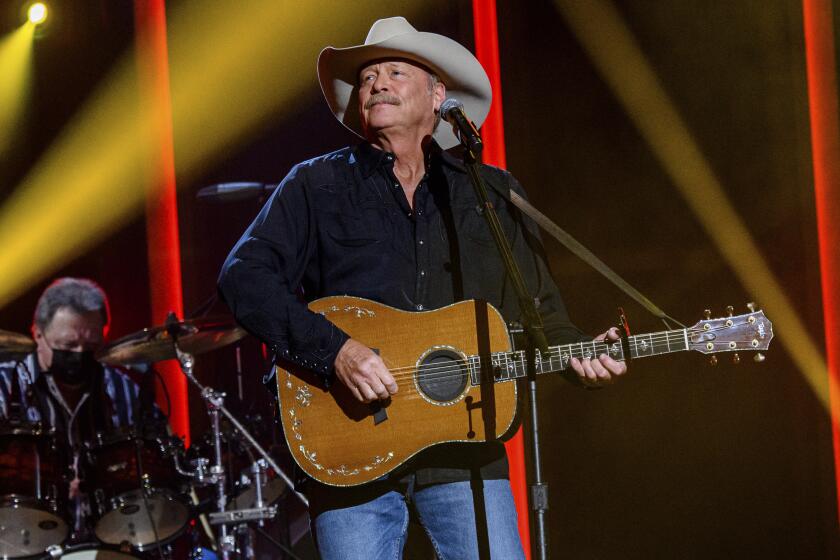JAZZ REVIEW : Playboy Festival Sags Until King Sunny Ade Refreshes
- Share via
Seven hours and 20 minutes into the show, the 10th annual Playboy Jazz Festival finally came alive Saturday night at the Hollywood Bowl.
Not a moment too soon, the unique Nigerian ensemble of King Sunny Ade brought a different and refreshing form of fusion to the stage in an orgy of song, dance and rhythm. Colorfully but not garishly gowned, the company of 18 men and three women included every conceivable type of percussion, along with a pedal steel guitar, four other guitars, a synthesizer and an electric bass.
Ade, 39, is a master of Juju music, compounded of elements from his native Lagos, West Indian flavoring, and dashes of jazz or R & B. The songs, with their infectious group vocals, were a seamless mixture of melodic charm and rhythmic complexity. Often the synthesizer simulated a steel drum sound so well that between him and the pedal steel guitarist it was hard to tell whether you had been transported to Jamaica or Hawaii.
The Nigerians offered the only new and exciting music in a day that had seemed much longer than its 8 1/2 hours. There is still a happy imagery attached to the jazz festival--the picnics, the partying, fun in the sun; the selling of the T-shirts, and the yelling of Bill Cosby. But the music Saturday was on a lower level than any other concert in the festival’s history.
Excessive compromise in the selection of talent was the chief culprit. If the quality had been upgraded somewhat, perhaps the show would only have sold out two weeks in advance instead of six.
Bad taste was in frequent evidence. It began when the generally excellent Cal State Long Beach college band sang a puerile, pointless song about the atomic bomb. It grew worse when Maynard Ferguson’s group, all high voltage and low aspirations, took over.
Ferguson, who not too many years ago led an admirable big band, now carries just one other horn. But he and his sidemen do everything in their power to compensate by blasting away at mediocre charts in a pathetic show that represents the nadir of the trumpeter’s long and once respected career.
The Ray Brown trio, with Gene Harris at the piano and Jeff Hamilton on drums, provided surcease, though they are better suited to a small club than playing for 17,641 revelers at the bowl.
Kirk Whalum, a tenor saxophonist who has struck it rich with a couple of pop albums, fielded a bassist who showed how to milk the crowd by prancing around, and a drummer whose forte is a long comedy scat vocal routine. Whalum’s fulsome sound on “Over the Rainbow” measured up (or down) to the general taste level of the day.
The World Saxophone Quartet consists of four musicians, playing a cappella. All have been widely praised, and the group’s blend is indeed remarkable, particularly in the attractive opening blues theme. But this was one of those days when freak notes, beyond the instruments’ normal range, were flying around seemingly without any regard for intonation. David Murray, the most popular of the four men, displayed his passion-fruity tone on tenor; Hamiet Bluiett showed how to try to make the baritone sax sound like a soprano, with predictable results. But at least the WSQ has something original to say, and says it without relying on volume as a crutch.
The Fabulous Thunderbirds, in stark contrast, geared themselves to simplistic blues, complete with vocals, harmonica, and three-chord monotony. This was good fun for the first 10 minutes, but the set lasted for an excruciating hour, during which the partying and the beer and wine consumption apparently rose in reverse proportion to popular concern for the music. Nevertheless, as their performance finally wound up, the T-Birds were treated to a jumping ovation.
On the other hand, while Carmen McRae was on stage the audience tended to become a little noisy and restless; musical subtlety has never been well received at large jazz festivals.
McRae sang a few numbers with her regular trio, then accompanied herself at the piano for a couple of songs. Finally she was joined by the Bob Florence orchestra and three excellent arrangements, two of which were devoted to contemporary and better-received material, “Love Dance” and Javan’s “Upside Down.”
The Florence orchestra had a short outing on its own, highlighted by a semifusionized updating of the old Glenn Miller theme “Moonlight Serenade.”
The success of Kenny G, who this year was heard at the festival for the third straight time, defies explanation. He’s a capable and uninspired saxophonist. His soprano sounds as though it has a sinus condition. In his group were a pop singer of no distinction and a bass player from Sweden who thumped and jumped. Later came the regular Kenny G routine of marching through the aisles, tenor sax in hand--a gimmick his naive listeners seem to fall for even though the sound of his horn is still being transmitted to, and heard from, the speakers on stage. For all the difference made by his whereabouts, he might as well have been in Long Beach, calling his solo in. His final on-stage performance, on soprano sax, was an interminable and egregious display of vulgarity.
Sunday’s program, which at least looked better on paper, will be reviewed Tuesday.
More to Read
The biggest entertainment stories
Get our big stories about Hollywood, film, television, music, arts, culture and more right in your inbox as soon as they publish.
You may occasionally receive promotional content from the Los Angeles Times.










